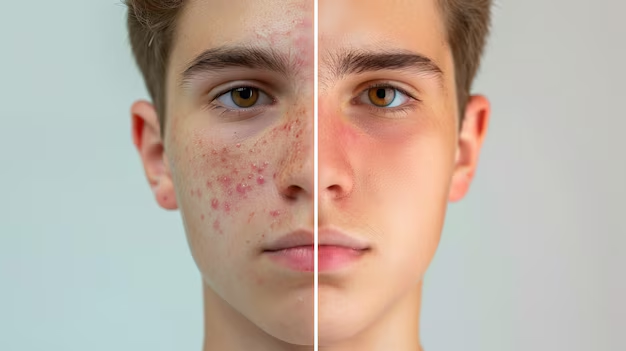Home » Acne News » AI Can Help Diagnose Acne Severity
AI Can Help Diagnose Acne Severity

Imagine taking a quick photo of your face and instantly getting an accurate assessment of your acne severity, with no appointment needed.
Well, you may not need to image for much longer!
Thanks to new developments in artificial intelligence (AI), this might soon be a reality for patients.
A new AI tool, AcneDGNet, is showing dermatologist-level accuracy when it comes to grading acne severity and could soon play a role in everything from clinic visits to telehealth.
Why acne grading matters
Grading acne severity is an important step in choosing the right treatment. Get it wrong, and you risk undertreatment, scarring, or frustration – especially for people with persistent or widespread breakouts.
Currently, this grading is normally done in-person by dermatologists using visual checks. But it can be subjective, with different doctors grading the same acne differently. And, in places where dermatologists are harder to access, it may not be available at all.
What is AcneDGNet?
AcneDGNet is an AI model that can met those challenges by:
- Detecting acne lesions on the skin
- Grading acne severity with high accuracy
- Tracking changes over time
It works across a range of image types, including smartphone selfies, and has been tested in both online (remote) and offline (clinic-based) settings.
How accurate is it?
In clinical tests involving nearly 500 patients, AcneDGNet achieved 89.5% accuracy when grading acne severity using smartphone images, and 89.8% accuracy in clinic-based settings.
It outperformed junior dermatologists and matched the diagnostic accuracy of senior dermatologists.
The model was also effective at tracking acne over time, making it a potentially valuable tool for monitoring progress between appointments.
Unlike many earlier AI models, AcneDGNet was trained on the most diverse image set to date, improving its real-world performance across different lighting, skin tones and image quality.
Why this matters for patients
This kind of AI support could help make acne care more accessible, especially for people who don’t have easy access to a dermatologist.
It could also make grading more consistent, taking out some of the guesswork and variation between clinicians.
For those already on treatment, AI tools like this could help track whether things are improving over time, offering extra confidence and clarity along the way. And in clinics, it could act as a helpful triage or support tool, freeing up time for dermatologists to focus on more complex cases.
Dermatologist perspective
Dr Lisa Byrom, dermatologist and acne expert, says AI tools like AcneDGNet could be a game-changer.
“This algorithm demonstrated nearly 90% accuracy – close to the performance of senior dermatologists – and worked well with both smartphone and clinic-based images,” she explains.
“It could help standardise acne grading, improve follow-up accuracy, and serve as a valuable support tool, especially in rural or under-resourced settings.”
What’s next?
While AcneDGNet isn’t available to the public just yet, studies like this show how AI is starting to support dermatologists and may soon be part of everyday acne care.
Future versions could become even more accurate by using multiple image types or combining photos with patient history.
